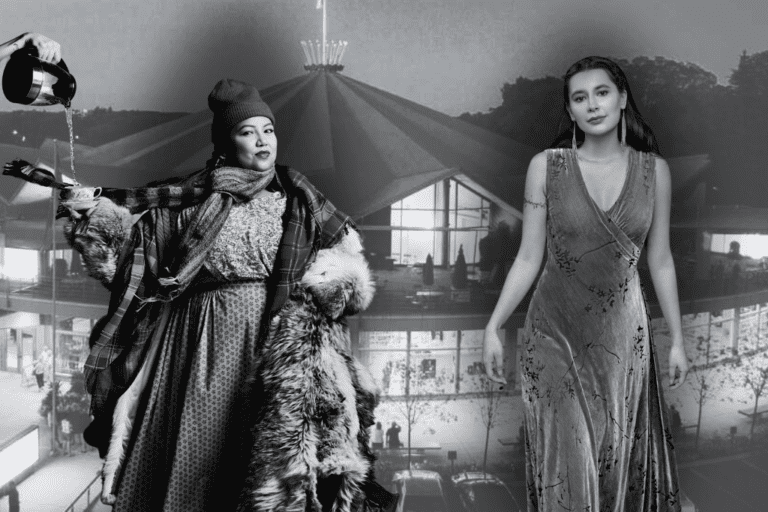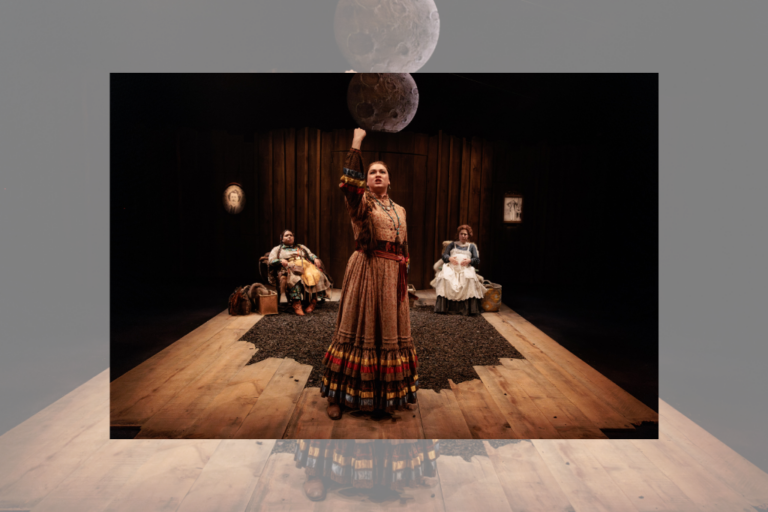REVIEW: With Richard Three, Shakespeare in the Ruff affirms their tradition of re-imagining Shakespeare in powerful ways
There is a rift in the time-space continuum at Withrow Park this summer: multiverse Richard III has met Shakespearean universe Richard III for a coronation and some Shakespearean hijinks.
In Richard Three, a Shakespeare in the Ruff production created by Patricia Allison, Richard III (Alexia Vassos) is interrupted by the sudden appearance of Other Richard (Allison, filling in for Alex Bulmer the night I attended). Other Richard comes from a less power-hungry and more compassionate parallel universe than the one he has found himself in. Both Richards are disabled, but their worlds have disparate disability cultures, and each universe has fostered disparate attitudes surrounding their capabilities.
Unsure how to get back his less “mean and murder-y” universe, Other Richard helps get Richard III crowned in exchange for his safety and hopefully finding his way back home. Initially, Richard III is less than impressed with his new companion, but once he finds a use for Other Richard, he develops a fondness for him. Everyone Else (multiple characters played by Christine Horne) is blind to the existence of Other Richard, setting up multiple entertaining situations.
In her program note, Allison says that on top of the multiverse Richard concept being cool, it’s a handy way to untangle the idea that Richard III was a monster because of his disability, and reclaim him as a disabled character. Using the idea of multiple universes is a bit of a play on the degenerative multiple sclerosis that Allison lives with, she says in the program note, stating that her reality and expectations of herself evolve with the sclerosing in her brain.
At the risk of oversimplifying a complex history, it’s commonly understood that Richard III was tyrannical and deformed thanks to the work of people like William Shakespeare. When you do a deeper dive into the real-life historical figure, it’s easy to find that he was a good leader, translated the law into English so that all literate citizens had access, set up legal aid, and funded many educational institutions. While he was in fact disabled, the concept of him being deformed with dubious morality was part of a smear campaign by Henry Tudor, the man who ultimately usurped his throne. The superficial takeaway is that he was either disabled and immoral or able-bodied and virtuous, as though disability is a moral failing and any unfavourable decisions made are to be judged accordingly.
Allison, an active member of the disability community, offers a different, needed perspective on the history of Richard III. Working with disabled actors and engaging with disabled consultants (Ophira Calof) provides a nuanced perspective on Shakespeare’s Richard III, and more general commentary on the discourse surrounding documented history, as well as the impact it has on how disabled people see themselves and how they are seen. Richard III was indeed disabled; he worked in a shady profession, was proficient in battle, and also created just policies that were progressive for his time.
The choice to cast differently disabled women as Richard is an effective one. Conversations between the visibly disabled Vassos and the less visibly disabled Allison offer a satisfying way to explore the two basic takes on the complex reality of Richard III from a disability perspective. How do we assess and prioritize the worthiness of bodies? Which is more deserving and morally superior, and who decides? Allison and cast bring the understanding of their lived experiences and deftly unravel the “monstrous” disabled person trope, as well as how that cliche has bled into present day discourse. Vassos steals the show in her humanization of Shakespeare’s Richard III.
Horne, playing all non-Richard characters in the play, shows off her acting chops here, despite making the able-bodied characters seem almost interchangeable. Blurring the able-bodied characters together renders them one-dimensional, only there to push the plot along, secondary to the unique situation the Richards find themselves in. To me, it’s a unique choice that almost serves as commentary on how disabled people are often situated in mainstream stories as devices rather than complex humans.
Amelia Blaine’s set design is satisfyingly simple. Six standing arches of warm LED lights that bracket the walking path through the park, they could easily be permanent installations. Though they aren’t engaged meaningfully until the very end of the play, they give off an aesthetically pleasing, sci-fi wormhole vibe.
Though Richard Three is Allison’s brainchild, I imagine stepping in for Bulmer (as she did for the first half of the run) must have been daunting nonetheless. With some tweaks to incorporate her MS and armed with her “Richard Three field notes” (a copy of the script for both the last minute job and the memory lapses related to MS), she was a great counter to Vassos’s formidable Richard III until Bulmer could re-join the cast.
With Richard Three, Shakespeare in the Ruff continues their tradition of re-imagining Shakespeare in creative and powerful ways.
Richard Three closed on September 3. You can learn more about Shakespeare in the Ruff here.
Intermission reviews are independent and unrelated to Intermission’s partnered content. Learn more about Intermission’s partnership model here.















Comments